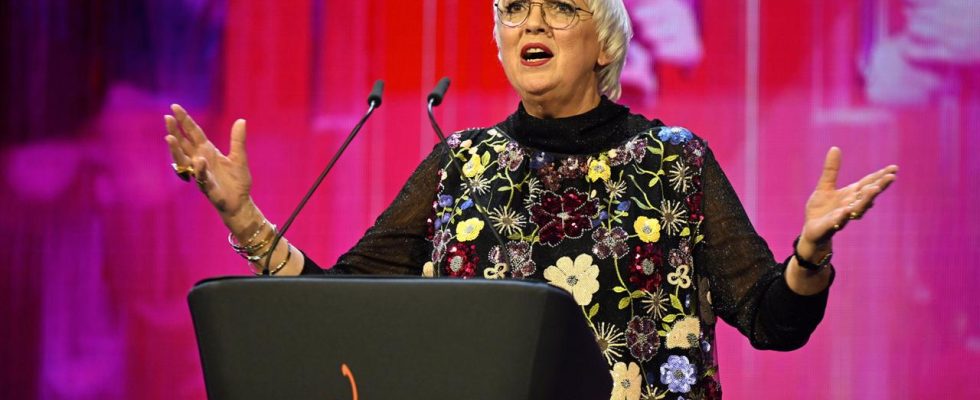analysis
Anti-Semitism in the cultural sector is not a new phenomenon. Now statements about Israel and the Gaza war at the Berlinale are causing outrage. Minister of State for Culture Roth is also criticized.
A day and a half passed before Claudia Roth responded. The Minister of State for Culture announced on Monday afternoon: “The statements at the Bear Awards at the Berlinale on Saturday evening were shockingly one-sided and characterized by a deep hatred of Israel.”
It’s about statements made by cultural workers on stage who she also sees as anti-Israel. At the end of his acceptance speech, one of the filmmakers spoke of a genocide in the Gaza Strip. These “incidents”, as Claudia Roth calls them, should now be dealt with: we will evaluate how it can be ensured in the future that the Berlinale is free from hatred, agitation, anti-Semitism, racism, anti-Muslim and any form of misanthropy, she says .
Reminder of Documenta 2022
The statements of the cultural workers, the applause of the audience, all of this triggered strong criticism. On the cultural scene itself. On the organizers. But also Claudia Roth. As was the case after the anti-Semitism incident at the Documenta in Kassel in 2022: At that time, one of the works of art showed a Jewish-Israeli soldier with a pig’s face.
“Once again, many politically responsible people are cowering at the Berlinale and don’t have the courage to stand up against applause for hatred of Israel,” criticizes the President of the Central Council of Jews in Germany, Josef Schuster. The deputy CDU parliamentary group leader in the Bundestag, Dorothee Bär, criticizes that one anti-Semitism scandal followed the next during Roth’s term in office. Commentators are questioning Roth’s future as Minister of State for Culture.
Democratic processes take time
It is not the case that Claudia Roth is completely inactive when it comes to anti-Semitism. But the wheels of democracy grind slowly. The line between censorship and artistic freedom is a thin one. And not everything that sounds like a solution is actually easy to implement. For example, Berlin’s Senator for Culture Joe Chialo’s attempt to introduce an anti-discrimination clause for cultural funding failed due to legal concerns. Roth had previously been skeptical about this proposal. But she wants to stay on the topic: “We are checking what can or must be made clear in funding guidelines and grants,” said Roth last week in the Bundestag’s culture committee.
Constitutional lawyer Christoph Möllers is currently working on a corresponding paper. After the Documenta scandal, he had already written a report on the political handling of such cases. The new paper is scheduled to be presented in March. The demands of many politicians are already aimed at financing: “We also have to talk about federal funding,” was the reaction of FDP parliamentary group leader Christian Dürr to the Berlinale incident.
Hatred of Israel is hard to stop on the open stage
If Minister of State for Culture Roth has her way, the individual cultural institutions should work on their own code of conduct in order to better address conflicts surrounding the topic of anti-Semitism in the future. Roth calls this “Codes of Conduct” and wants to support it. But what would that mean for the specific case of the Berlinale? What should have been different? Nothing, says Meron Mendel, the anti-Semitism expert and director of the Anne Frank Educational Center. “If prize winners use the stage for political provocation, what should you do? Should security guards jump on the stage? Pull away the Palestinian scarf? Or should someone come on stage afterwards and give a lecture on the history of the Middle East conflict? I lack imagination.”
Yes, says Mendel, there is a one-sided view of the cultural scene, especially towards the current conflict. But trying to stop this with political decisions is wrong. Politicians could and should use arguments to respond to this. In terms of content. Mendel calls discrediting the Berlinale as a whole a “failure of politics.” After all, a lot has already been done for the exchange that should be pointed out instead. He mentions, for example, the Tiny House Project at the Berlinale, a place for Berlinale visitors to talk about the Middle East conflict, about Israel and Palestine.
These are small steps on a long path in the fight against anti-Semitism. Similar to the suggestions made by Minister of State for Culture Roth. The controversies aren’t going away any time soon. Meron Mendel’s advice: “We have to learn to endure such debates.”

